Meet Laina Greene, CEO and co-founder of Angels of Impact, a social enterprise network of investors and entrepreneurs, whose mission is to eradicate poverty by supporting and building sustainable, women-led businesses. Born and raised in Singapore, Laina has lived and worked around the world, dedicating her time to various causes—but none more than that of female empowerment. She speaks to NG WENG LIN about her quest for equality, dignity, and unity.
What led you down this path of creating impact? Were there certain events or moments in your life that motivated you to tackle social problems?
My pursuit of giving back to society is largely attributed to the way my parents brought me up. Despite being Singapore government civil servants of modest means, they always made us do social work with them. Both my parents did volunteer work outside of their working hours through organisations they started or supported. My father was very involved in the Sree Narayana Mission for the Aged Sick and my mother founded and ran the Charity Squad at Raffles Institution. Growing up, even my own birthdays were turned into social work as we celebrated it with orphan children, so we were always reminded we had more than others. I am truly grateful to them for this upbringing as my life has been so meaningful and I always seek to help others in any way I can.
You have done extensive work on poverty alleviation. What is one key message regarding this issue that you would like people to hear?
I want people to realise that poverty is NOT something that can never be ended. Poverty is the number one United Nations Sustainable Development Goal (UNSDG) because it is the key to solving the other UNSDGs such as health, education, etc. Poverty was created by the way we run our economy and the system of profit maximisation for the few. If we consciously create a more just and regenerative economy, we can eradicate poverty. The eradication of poverty shouldn’t be left to charitable work, but rather we need to tackle it at the systems level and enable people living in poverty to earn and live dignified lives.
For us at Angels of Impact, we believe that women are key to ending poverty, and thus investing in women who run businesses that support many more micro-entrepreneurs is a start to this process of systems change. There are, of course, top down solutions such as policy changes that are also needed to make this possible. The key, however, is to see people living in poverty, as dignified, innovative, and resourceful people who have the keys to unlocking the problems around poverty. As the Nobel Laureate, Prof Yunus puts it, poor people are like bonsai trees, the only difference between a bonsai tree and a tree growing big in a forest is the resources it is given—it is the same seed.
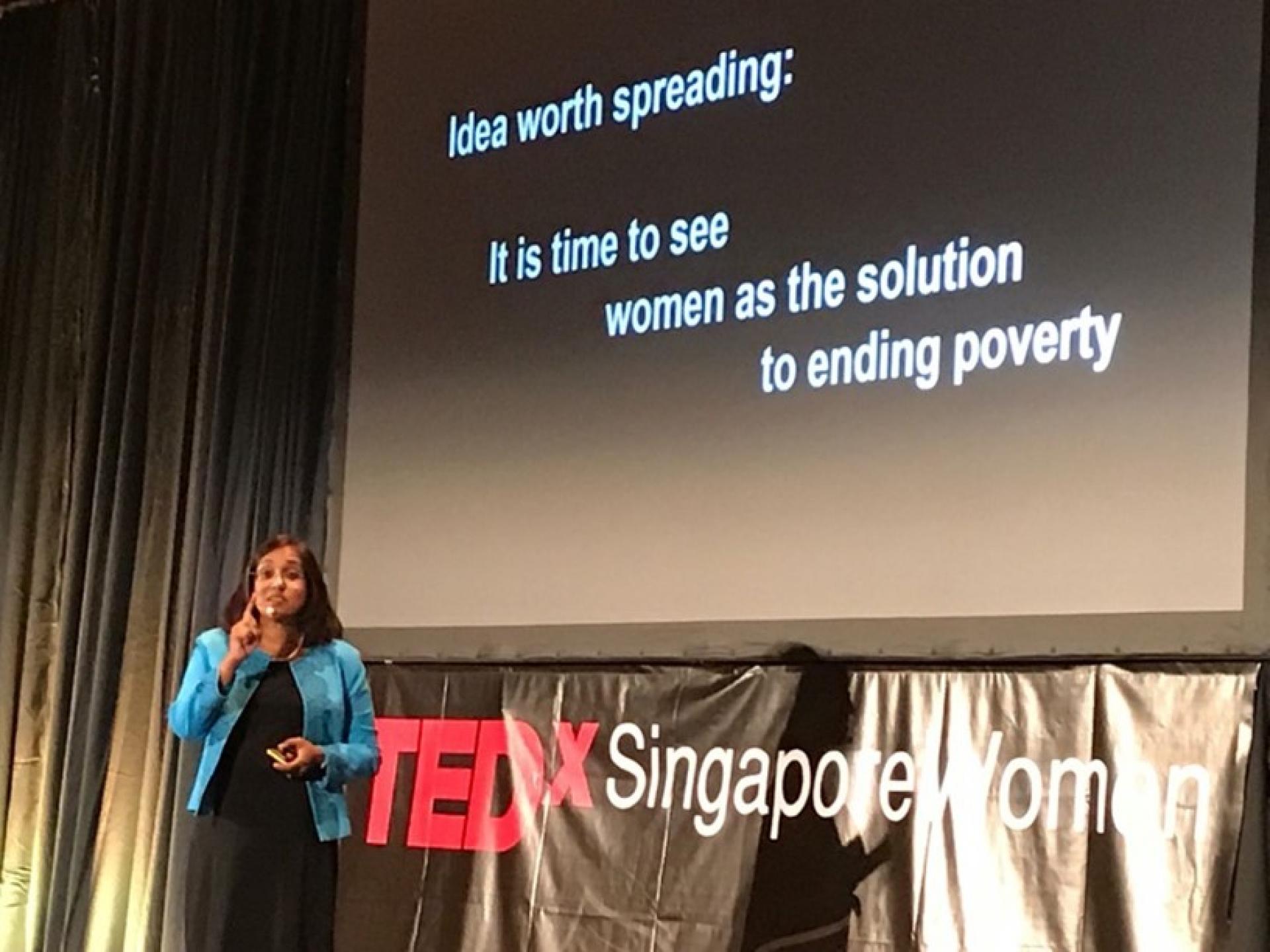 Laina at the TEDxSingaporeWomen 2016 conference, where she spoke about the key role that women play in ending poverty.
Laina at the TEDxSingaporeWomen 2016 conference, where she spoke about the key role that women play in ending poverty.
In your opinion, what are the qualities of an empowered woman?
As far as I am concerned, most women are already full of power and don’t need to be empowered. What they need is an opportunity to shine and to be given the resources to make an impact. To be given the opportunity, they need to be seen and respected. I see women as very resilient and resourceful, and always finding ways to give back to their families and communities. Did you know that women entrepreneurs are known to make 20% more revenue with 50% less capital, and for every dollar a woman earns she gives back up to 90% to her family and community, as opposed to men who give back up to 30%? It is therefore so evident that we have to offer women opportunities to succeed which will contribute to the betterment of society.
Much of what you do is inspired by the principles of the Baha’i Faith. Could you share a little bit more about this and how it has influenced your work and way of life?
I am very influenced by the Baha’i Faith. The word Baha’i means the follower of light, and as Baha’is we are called to be servants of humanity. Eradication of extreme poverty and gender equality in the Baha’i Faith are seen as key issues to address in order to achieve global peace and prosperity. Quoting from the writings, “The world of humanity has two wings—one is women and the other men. Not until both wings are equally developed can the bird fly. Should one wing remain weak, the flight is impossible.”
We are also reminded that just as a child in the mother’s womb develops limbs it doesn’t need in the womb but it needs in the physical world, so likewise we are here in this physical world to build the limbs we need for the world of spirit after we die. I always try to focus on building my spiritual arms and legs, and the best way to do this is in service of others. I will say it influences how I live and work.
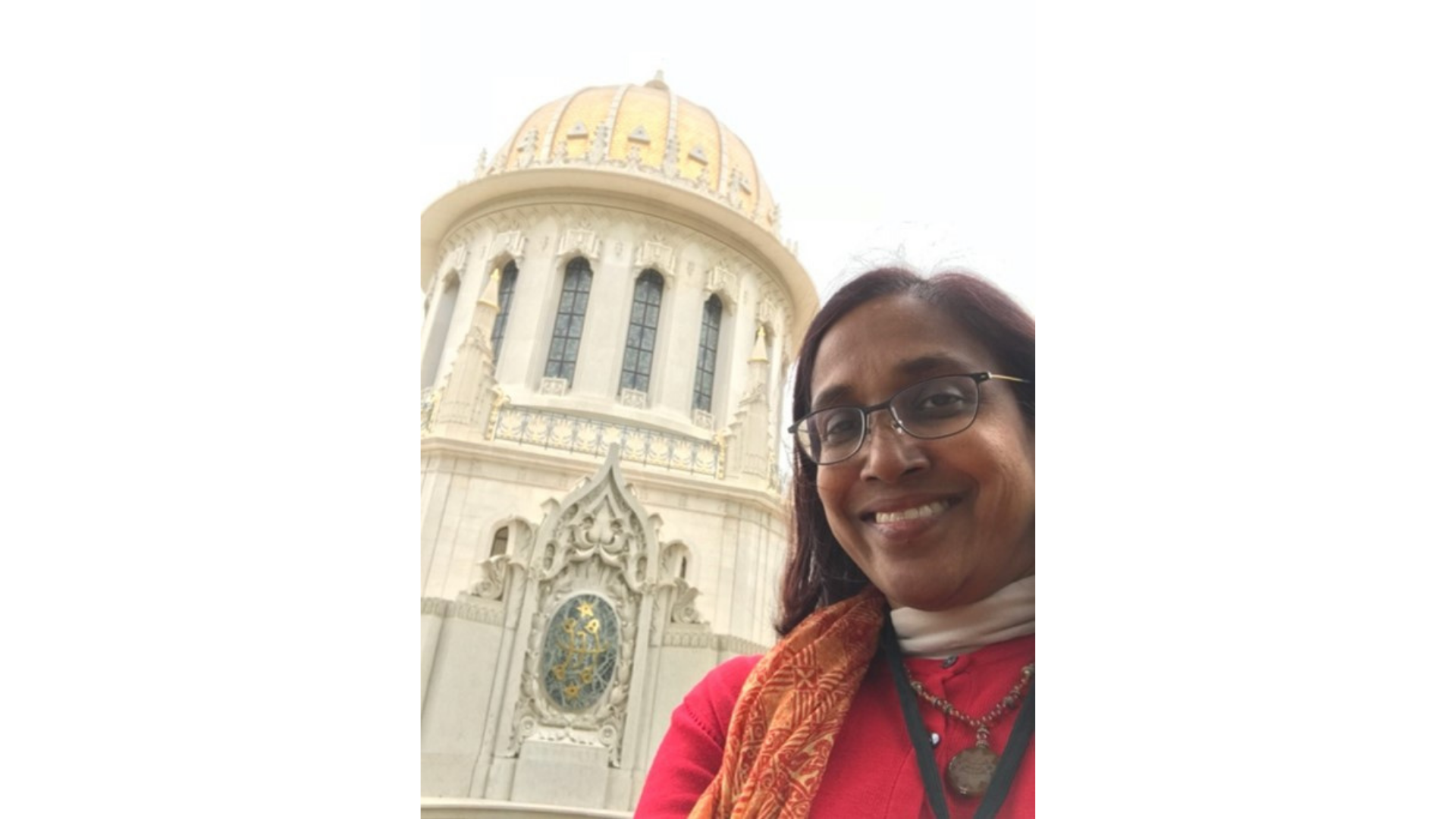 Visiting the Baha’i World Centre In Haifa, Israel.
Visiting the Baha’i World Centre In Haifa, Israel.
What are some memorable encounters you have had over the course of your career?
My first decades of career were predominantly careers dominated by men, so they were not fond memories—lots of #metoo moments, lost opportunities, being invisible and even not being able to raise funds for my venture despite it being profitable and having great clients. That’s why I focus on amplifying women’s work through Angels of Impact. Most memorable for me is meeting the founder of Toraja Melo, who taught me a lot about how community-based entrepreneurship is a key tool to ending poverty. I had the opportunity to visit her village in Toraja and met the wonderful weavers who work with her. I saw firsthand how she improves lives in her village and the respect and love they had for her and for the impact she makes in their lives. I knew through her work, that investing and supporting women was the key to how I could use my resources and network to make a bigger impact. I spoke about her in my TEDxSingaporeWomen talk back in 2016.
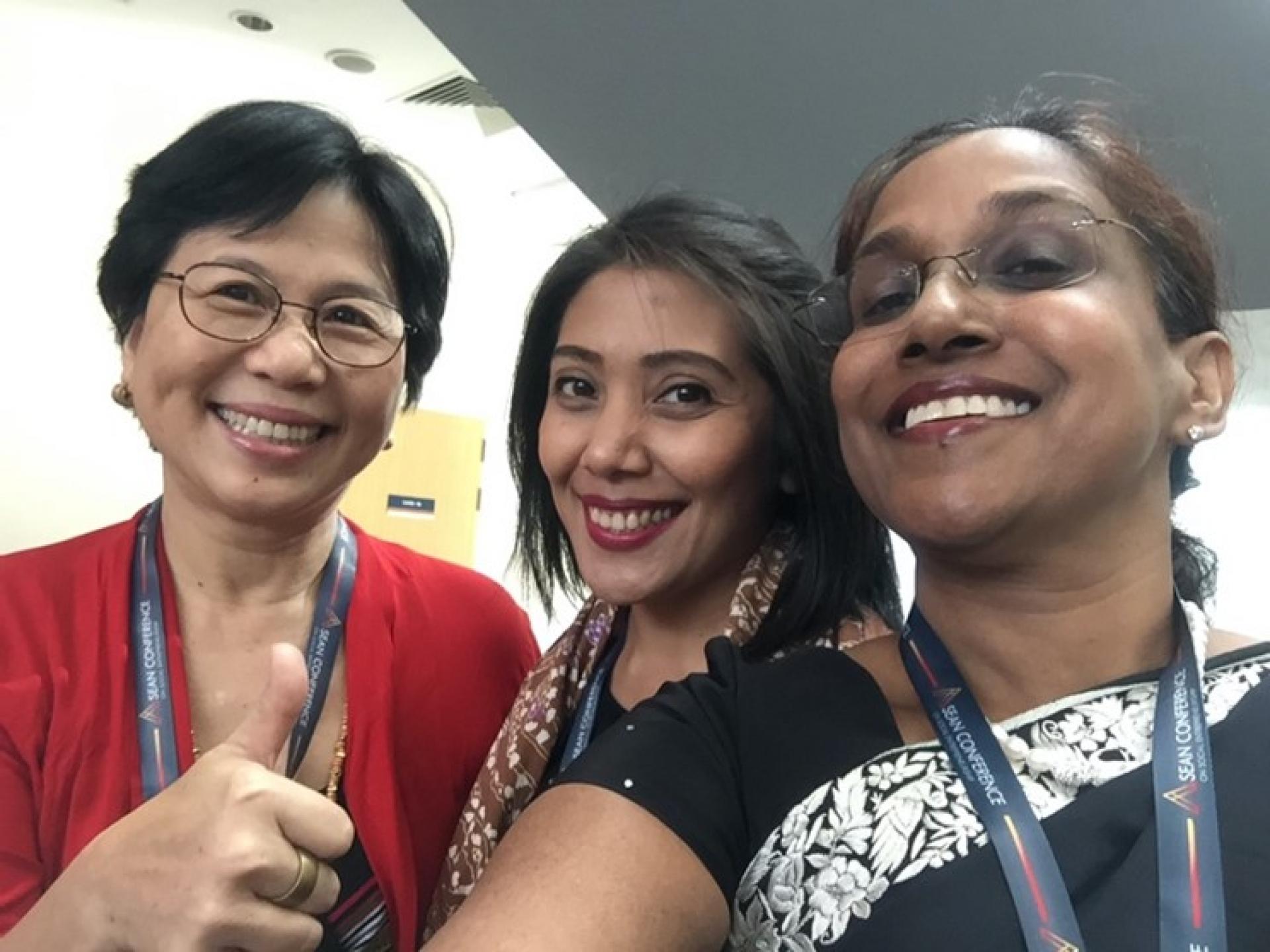 With Dinny Yusuf (left), founder of Toraja Melo, and Nancy Magried (centre), founder of Batik Fractal, an Indonesian craft-based social enterprise.
With Dinny Yusuf (left), founder of Toraja Melo, and Nancy Magried (centre), founder of Batik Fractal, an Indonesian craft-based social enterprise.
As members of a multi-ethnic community here in Singapore, how can we better promote intercultural understanding?
I think in Singapore, we often like to think that calling ourselves Singaporean is enough to create a common bond. That as “Singaporeans”, we have no “minorities” and so we are automatically color-blind or treat everyone equal. Color-blindness is the cause of racial unrest. It is this very attitude that makes us blind to learning and respecting our differences and realising how minorities in Singapore truly feel. As any minority in Singapore, most majority Singaporeans don’t take time to understand how their friends feel when asks them where they are from for instance, or have people pinch their noses when they enter an HDB lift. Minorities are bound to feel like “the other” when others feel equal.
What we need in Singapore is unity in diversity. How can we embrace each other’s differences and yet celebrate our unity as citizens of one nation? We can better promote intercultural understanding by building deeper friendships across ethnic communities and being open to learning more about each other. The Baha’i community in Singapore does this through opening their homes for interfaith devotionals and study groups on spiritual topics such as service and life after death. When we pray together with people of all Faiths and have meaningful conversations across ethnic groups, we build deeper bonds and connections. Friendship and amity are key to building unity. It is through bonds of true friendship and understanding that we can avoid these ugly incidences. Standing up when you see something racist is also key.
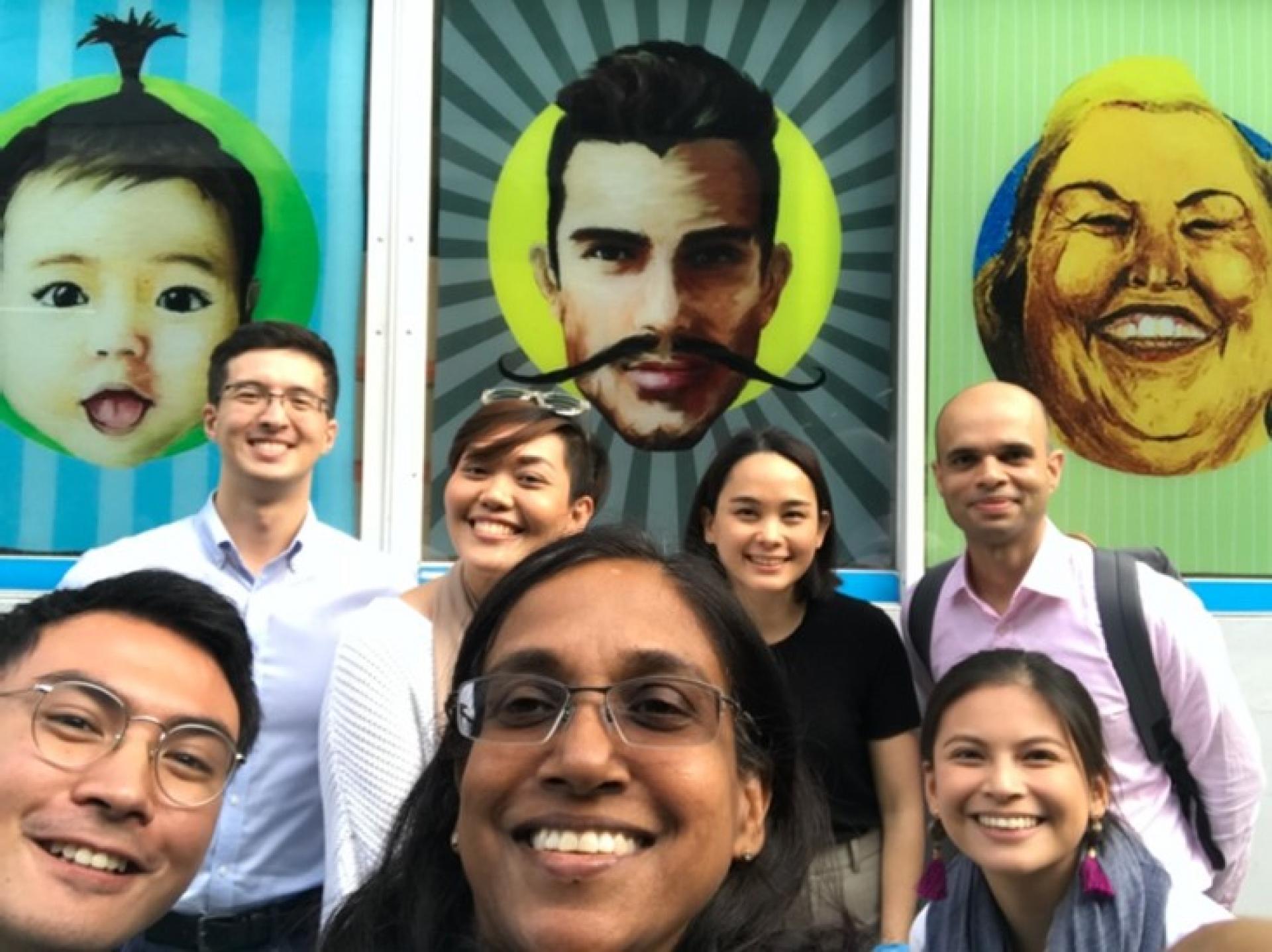 Laina (centre) during a visit to Messy Bessy, a personal care product social enterprise that educates marginalised youth in the Philippines.
Laina (centre) during a visit to Messy Bessy, a personal care product social enterprise that educates marginalised youth in the Philippines.
What keeps you going through difficult times?
I keep reminding myself that I am just trying to do my own part in the greater scheme of the universe. I try to remember that someone else is suffering more than I am, and by focusing on how I can serve and seeing the joy in their face, it helps me get over my own difficulties. Prayer and meditation also help me greatly as I find myself connected to something greater than me, and the difficulties I face seem small compared to the greatness of the universe.
Who inspires you?
For my work at Angels of Impact, the women entrepreneurs I work with inspire me to keep going. When I hear their stories and see the people they impact, I marvel and get inspired by how they can make so much impact with so little resources. I am thus inspired to try to do more to support their work. People who step up to volunteer their time to help also inspire me and remind me to keep believing in the goodness of humanity. I am also inspired by the work of the Baha’i community all around the world. People who dedicate time and resources to build unity in their communities and inspire a sense of oneness.
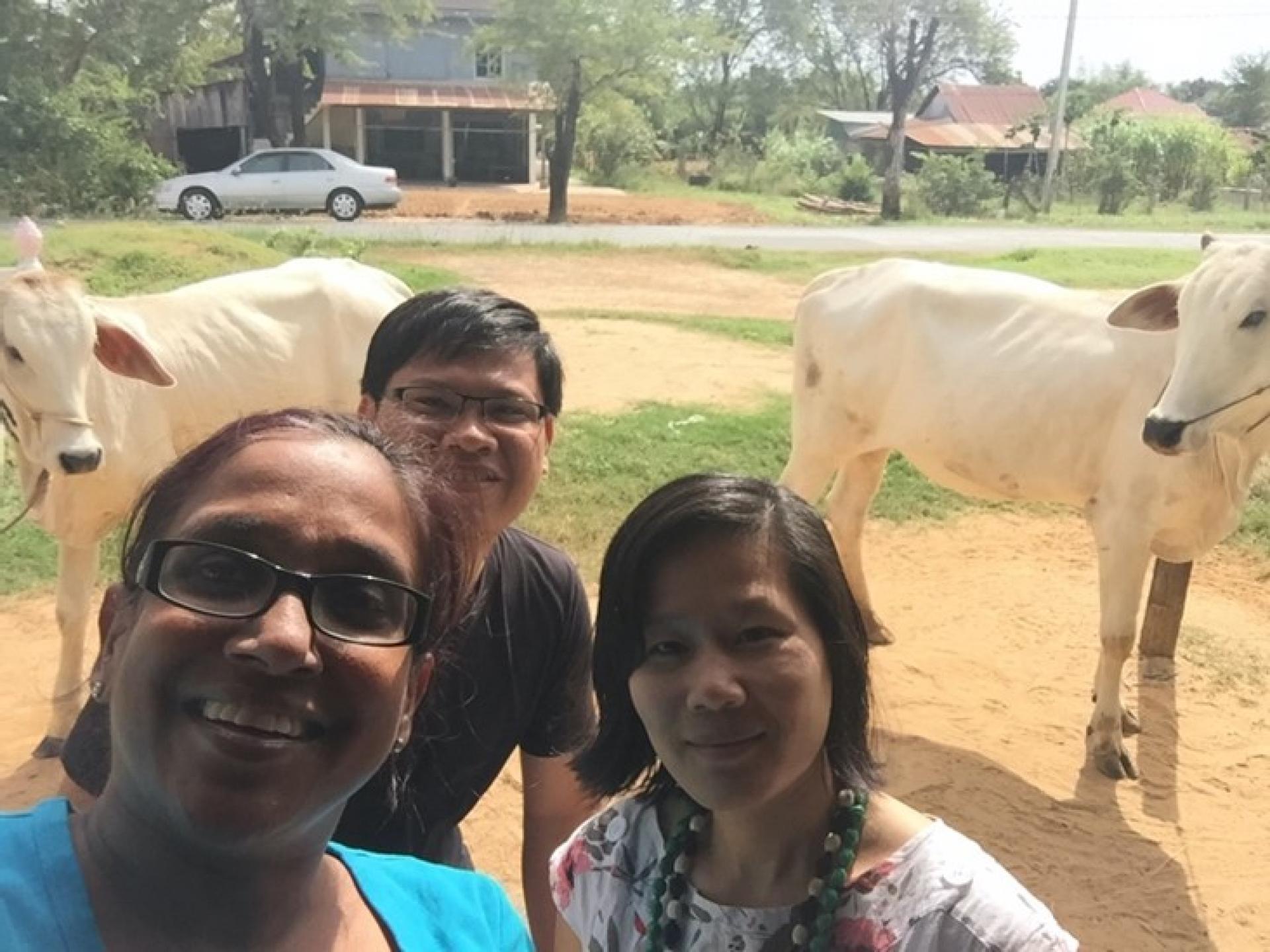 Laina (left) and the Angels of Impact team often work with social businesses such as Color Silk, an enterprise that empowers communities while promoting traditional Cambodian silk weaving.
Laina (left) and the Angels of Impact team often work with social businesses such as Color Silk, an enterprise that empowers communities while promoting traditional Cambodian silk weaving.
What do you do on your days off?
I love going to the beach and listen to the waves. I used to spend my childhood days by the beach with my family, and that’s what relaxes me the most. I also love good movies and visiting with good friends.
Is there any advice would you give to your younger self?
Yes—not to worry about what other people think of you. I have come to realise that everyone is busy worrying about what other people think of them, and that no one is thinking about you. I also love the advice of Maya Angelou, who said “I've learned that people will forget what you said, people will forget what you did, but people will never forget how you made them feel.”
What does the ideal society look like to you?
One where everyone is seen and respected and that everyone can grow to their full potential. Also one where everyone is constantly finding ways to serve one another. How wonderful if we all are connected and live full and happy lives. A key figure of the Baha’i Faith (Abdul Baha) always asked people when he met them, “Are you happy?” If only we can strive to be happy and joyful beings—what an ideal world we would be living in. Taking another quote from the Baha’i writings, “The well-being of mankind, its peace and security, are unattainable unless and until its unity is firmly established.”
All images courtesy of Laina Greene.








Comments